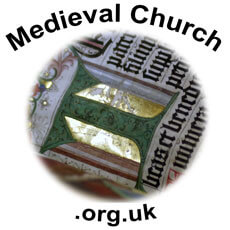Boniface (c.675 - 754)
Theology on the Web helps over 2.5 million people every year to find high quality theological resources that will help to equip them to serve God and to know Him better (2 Timothy 2:15). Like other websites that provide free services, it is dependent on donations to enable it to grow and develop and only 0.004% of visitors currently do so. If you would like to support this site, please use one of the options to the right of this message.
Synopsis
BONIFACE (Winfrid, the "Apostle of Germany"), b. at Kirton near Exeter, between 680 and 683; d. near Dokkum in Friesland, June 5. 754 or 755; a Saxon by birth; was educated in the monasteries of Adescancastre and Nhutscelle, and had already acquired a name for learning and piety, when, in 716, he left his native country, and. joined the missionary Willibrord in Friesland. Political circumstances, however, made missionary labor an impossibility in that field at that moment; and Boniface returned to England. But in 718 he again started for the Continent. This time he went to France, and thence to Rome; and with papal authorization he repaired in 719 to Germany. His first attempts as a missionary in Bavaria and in the Frankish dominions failed, and he once more joined Willibrord in Friesland. After the death of the latter, Boniface returned to Germany (722); and in the region between the Lahn and the Saale he finally succeeded in taking root, and forming for himself a basis of operation. Front this moment to his death he labored with great success in Hesse, Bavaria, and, after the death of Charles Martel, also in the Frankish Empire. In 723 he was made a bishop; in 732, an archbishop. His last effort was a tour into Friesland, where a Pagan reaction had taken place after the death of Willibrord; and here he was killed while administering confirmation to those who had remained faithful. His work consisted, however, not so much in the preaching of Christianity as in the propagation of Romanism, which to him was identical with Christianity organized, and which, perhaps, was the best for that age. He labored mostly in countries which had already been Christianized by the Iro-Scottish missionaries; and the result of his labor was simply the establishment of the Roman hierarchy. He formed bishoprics, and secured bishops who were willing to administer their dioceses in sub-mission to the Pope. To convert Pagans to Christianity was not his only or his chief office, but to drive away by force or intrigue the independent Christian missionaries, and replace them with Roman priests; and at the time of his death that part of Germany which had received Christianity was firmly connected with the Roman see.
Philip Schaff, ed., A Religious Encyclopaedia or Dictionary of Biblical, Historical, Doctrinal, and Practical Theology, 3rd edn, Vol. 1. Toronto, New York & London: Funk & Wagnalls Company, 1894. pp.311-312.
Primary Sources
Secondary Sources
Related Subjects
Germany
 |
|
 |
|
 |





 Boniface, The Letters of St. Boniface,
new edn,, Ephraim Emerton, translator. Columbia University Press, 2000. Pbk.
ISBN: 0231120931. pp.220.
Boniface, The Letters of St. Boniface,
new edn,, Ephraim Emerton, translator. Columbia University Press, 2000. Pbk.
ISBN: 0231120931. pp.220.
 G.S.M. Walker, The Growing Storm. Sketches of Church History from A.D. 600 to A.D. 1350. London: The Paternoster Press, 1961. Hbk. pp.252.
G.S.M. Walker, The Growing Storm. Sketches of Church History from A.D. 600 to A.D. 1350. London: The Paternoster Press, 1961. Hbk. pp.252.  J.M. Wallace-Hadrill, The
Frankish Church. Oxford History of the Christian Church. Oxford: Oxford
University Press, 1983. Hbk. ISBN: 0198269064. pp.150-61.
J.M. Wallace-Hadrill, The
Frankish Church. Oxford History of the Christian Church. Oxford: Oxford
University Press, 1983. Hbk. ISBN: 0198269064. pp.150-61. Frederick W. Weidmann, Polycarp and John: The Harris Fragments and Their Challenge to the Literary Traditions. Notre Dame, IN: University of Notre Dame Press, 1999. Hbk. ISBN-13: 978-0268038519. pp.189.
Frederick W. Weidmann, Polycarp and John: The Harris Fragments and Their Challenge to the Literary Traditions. Notre Dame, IN: University of Notre Dame Press, 1999. Hbk. ISBN-13: 978-0268038519. pp.189.


